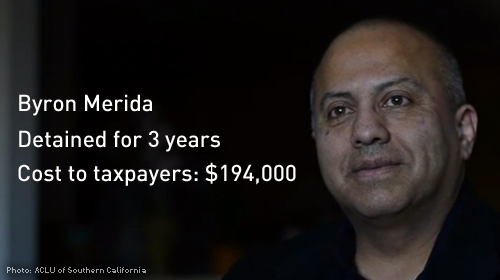
Apparently as a result of sequester-induced budget cuts, Immigration and Customs Enforcement recently that it found were not risks either to flee or endanger public safety. The fact that these detainees were locked up in the first place confirms a startling truth about our immigration detention system: the government routinely detains people for no good reason. Even Department of Homeland Security Secretary promised to examine why these detainees were in jail, saying: "That's a good question. I've asked the same question myself...so we're looking into it."
Our government detains tens of thousands of immigrants daily across the country – about 430,000 total in the last recorded year, 2011, with a price tag of $2 billion annually. Many have no opportunity for a bond hearing which is where an immigration judge can determine, based on the evidence presented, whether a person should be detained. In the current system, lots of people who present no danger or fight risk – including refugees with no criminal history and long-time lawful permanent residents who committed relatively minor criminal offenses and served their time – end up detained for the months or years it takes to resolve their immigration cases.
The ACLU has challenged these policies in Rodriguez v. Robbins, a class action lawsuit brought on behalf of hundreds of immigrants detained for long periods of time across Southern California. The relief the ACLU seeks is a right to a bond hearing, a time-tested, orderly, and reasonable approach to address the government's over-reliance on detention. Rather than allowing deportation officers to make detention decisions based on resource concerns, immigration judges can make a reasoned determination as to whether detention is warranted in any individual case.
Last year, in the Rodriguez case, U.S. District Judge Terry J. Hatter Jr. ordered the Obama administration to provide bond hearings for certain immigrants who have been locked up for more than six months. Judge Hatter's ground-breaking decision has helped ensure that the government does not waste resources detaining – sometimes for years – people who are not risks to public safety.
According to the government's own statements about the case, immigration judges on bond of approximately two-thirds of the people given hearings under Judge Hatter's order. That is, immigration judges – officials who work for the Attorney General of the United States – have concluded that the vast majority of these long-term immigration detainees can be released without endangering public safety.
One such person is who was unnecessarily detained for more than three years. Byron has lived in the United States for nearly three decades, during which time he started several successful small businesses. All of his immediate family members are United States citizens or lawful permanent residents. Nonetheless, the government decided to detain Byron without access to a bond hearing after it placed him in deportation proceedings following his conviction for a non-violent crime for which he served six months in jail.
Because of the government's draconian policies, it continued to detain Byron while his immigration case wound through the courts, including his successful appeal to the Ninth Circuit. When Byron finally got a bond hearing as a result of Judge Hatter's order, the immigration judge ordered him released on a $2,500 bond. In total, the government needlessly detained Byron for three years and four months -- at a cost of nearly $200,000 to the taxpayers.
There is a simple lesson we can take from these recent events – restoring due process would be a cost-effective and sensible way to fix the broken immigration detention system.
Please note that by playing this clip You Tube and Google will place a long-term cookie on your computer. Please see on their website and on theirs to learn more. To view the ACLU's privacy statement, click here.
Learn more about immigrant rights and other civil liberty issues: Sign up for breaking news alerts, , and .

